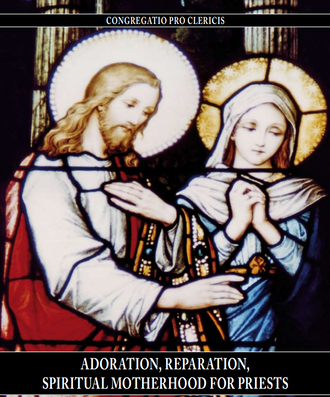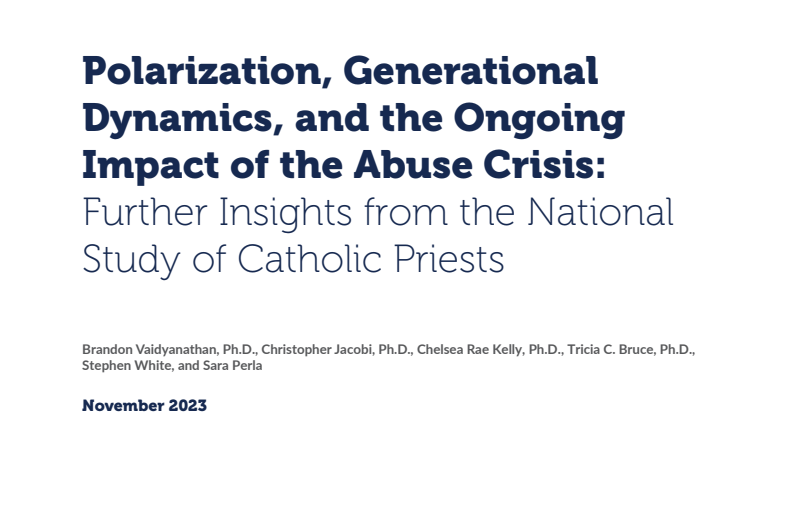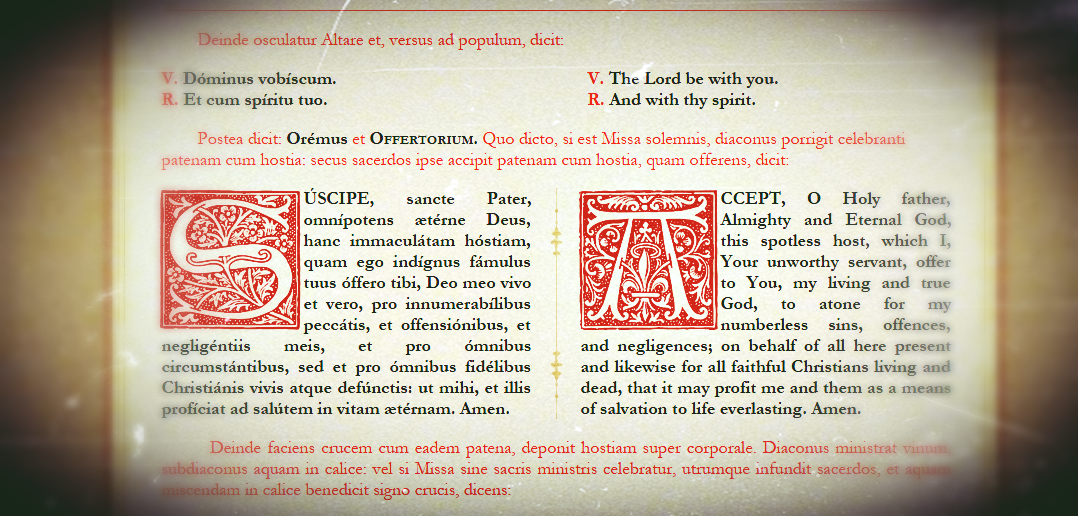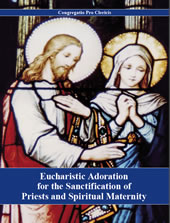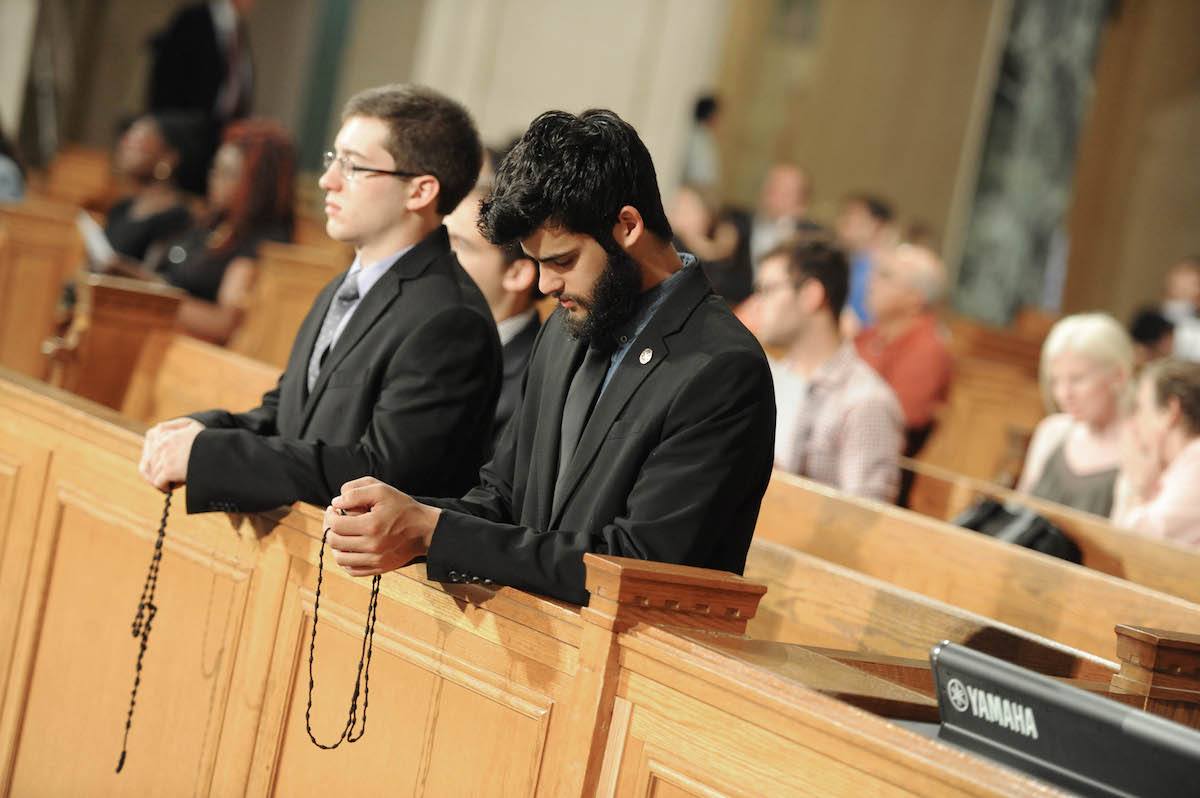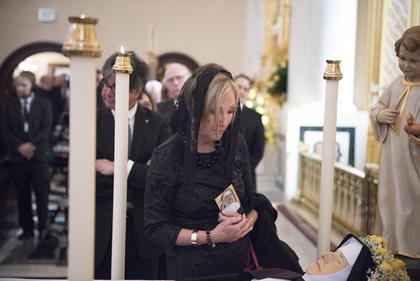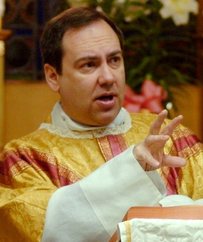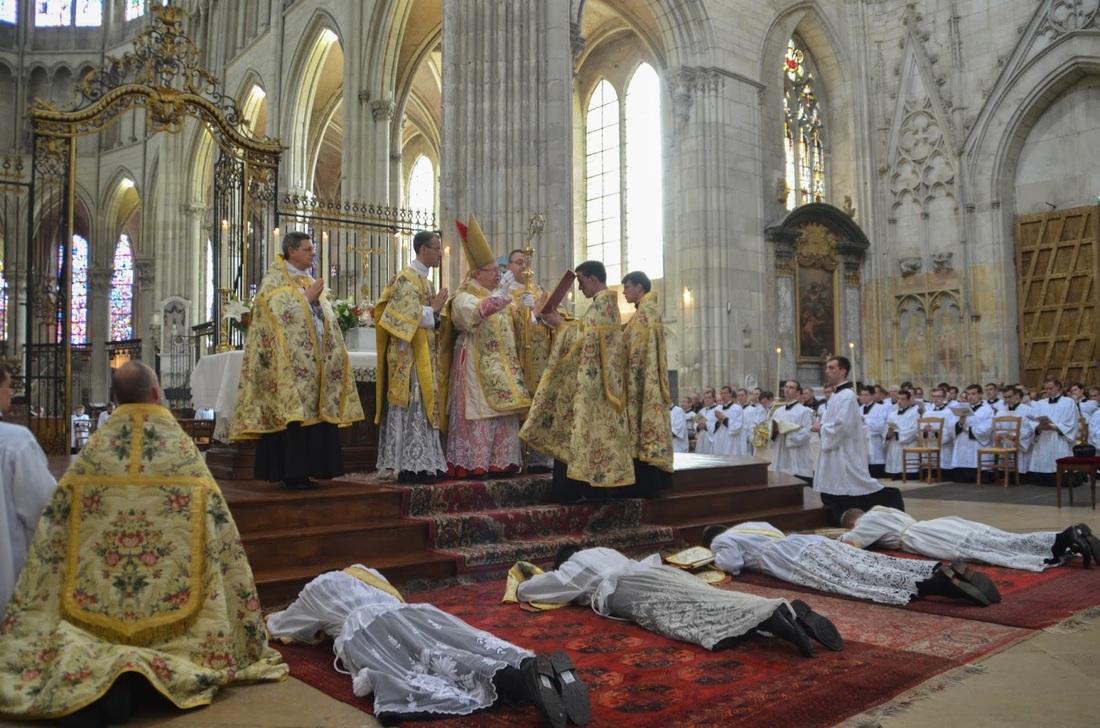Sorry! Mea Culpa!
It is evidently a typist's error that has caused, in various places on this website and in the parish bulletin, something which contains times for the celebration of the Traditional Latin Mass to be included in something mistakenly labeled as a "Mass Schedule." Far be it from us to include such uncouth and despicable liturgical throwbacks in the real Mass Schedule. Please ignore them wherever you see such ignorant writings, for they imply (again, in error) that "normal" Catholics might be invited to join in the "special" group (and you know what "special" means in this case) of lost people clinging to such outdated nonsensical Masses. In reality, these schedules were meant only for the sake of saving "normal" people from inadvertently wandering in during said "special people's" Masses and being scandalized beyond their spiritual and/or mental capabilities by the reverence and solemnity they will find there. This also helps us assure the "normal" people that they will not have any activities scheduled during the "special people's" Mass times, so that they don't catch cooties from the marginalized TLMers by being in the near vicinity of such a group of misfits.
Oops! Mea Culpa times 2! I'm terribly sorry once again, for, and I quote from the dubia answers which prohibit TLMs from being listed in parish Mass scheduled, "There is no intention in these provisions to marginalise the faithful who are rooted in the previous form of celebration: they are only meant to remind them that this is a concession to provide for their good" yet they are called "marginalized" in the preceding paragraph. Oh, wait! I rightly pointed out that they are being "marginalized" (with a "z") by not being able to even have the TLMs listed in the Mass schedule. The dubia response (click if you wish to read it) says that this is not intended to "marginalise" (with an "s") them, so I suppose that clears it all up! No harm, no foul. But please, don't intermingle or pray with those "special" people, or you will be "disobedient" to Rome.
Oops! Mea Culpa times 2! I'm terribly sorry once again, for, and I quote from the dubia answers which prohibit TLMs from being listed in parish Mass scheduled, "There is no intention in these provisions to marginalise the faithful who are rooted in the previous form of celebration: they are only meant to remind them that this is a concession to provide for their good" yet they are called "marginalized" in the preceding paragraph. Oh, wait! I rightly pointed out that they are being "marginalized" (with a "z") by not being able to even have the TLMs listed in the Mass schedule. The dubia response (click if you wish to read it) says that this is not intended to "marginalise" (with an "s") them, so I suppose that clears it all up! No harm, no foul. But please, don't intermingle or pray with those "special" people, or you will be "disobedient" to Rome.
Safe Haven Sunday
The Diocese of St. Petersburg has quite a few resources available online that pertain to breaking or preventing pornography addiction. Below are just two of the resources you can find at this page: https://www.dosp.org/freedom-from-porn/resources/
Here is a link to counselors specializing in this field: https://www.dosp.org/freedom-from-porn/wp-content/uploads/sites/60/Local-Therapists-Safe-Haven2.pdfwww.dosp.org/freedom-from-porn/wp-content/uploads/sites/60/Local-Therapists-Safe-Haven2.pdf
RECLAiM Sexual Health offers a science-based, Catholic Online Recovery Program and other resources for those who desire to reclaim God’s plan for their lives and the lives of loved ones impacted by pornography or other unhealthy sexual behaviors. https://reclaimsexualhealth.com/Reclaim-Online-Program/features.html
The Diocese of St. Petersburg has quite a few resources available online that pertain to breaking or preventing pornography addiction. Below are just two of the resources you can find at this page: https://www.dosp.org/freedom-from-porn/resources/
Here is a link to counselors specializing in this field: https://www.dosp.org/freedom-from-porn/wp-content/uploads/sites/60/Local-Therapists-Safe-Haven2.pdfwww.dosp.org/freedom-from-porn/wp-content/uploads/sites/60/Local-Therapists-Safe-Haven2.pdf
RECLAiM Sexual Health offers a science-based, Catholic Online Recovery Program and other resources for those who desire to reclaim God’s plan for their lives and the lives of loved ones impacted by pornography or other unhealthy sexual behaviors. https://reclaimsexualhealth.com/Reclaim-Online-Program/features.html
|
Coming Clean About My Latin Problem
Steve Skojec April 18, 2018 24 My name is Steve, and I go to the Latin Mass – but I don’t know Latin. It’s been this way for years. At first, when I started out attending an indult Mass in the days before Summorum Pontificum, I thought someone might notice. But I was good at masking the symptoms, and nobody caught on. If I was looking at my hand Missal, they had no way of knowing which side I was reading. When I’d be invited for dinner at the house of a fellow Latin Masser, I’d quietly demur as they said the “benediction” instead of good old-fashioned “grace.” Eventually, through repetition, I learned how to pray most of the rosary in Latin, and that just gave me more cover. Once in a while, I’d throw out the only line I could remember from the Latin course I took during the one year I homeschooled: [CLICK HERE FOR THE REST. IT'S WORTH IT!] |
|
This is the document which I quoted in the Mother's Day bulletin. Click here or click on the image to read or download the document.
Spiritual Motherhood for PriestsThe vocation to be a spiritual mother for priests is largely unknown,
scarcely understood and, consequently, rarely lived, notwithstanding its fundamental importance. It is a vocation that is frequently hidden, invisible to the naked eye, but meant to transmit spiritual life. Pope John Paul II, was so convinced of its importance that he established a cloistered convent in the Vatican where nuns would pray for the intentions of the Supreme Pontiff |
|
The first time I wore a mantilla…
Posted on 10th March 2017 By Rhoslyn Thomas. The first time it ever occurred to me that I might like to veil, I was 21 and walking home from Mass. I admitted to my friend that I was having thoughts about wearing a mantilla. We both laughed: What was happening to me?! This wasn’t ‘me’ at all. But we had both changed a lot in that last year and we were slowly getting used to the idea of letting God take the reins in our lives... (click for more) |
Yes, it is an acceptable and laudable practice to say the Rosary during the Mass! If you don't know how this can instill and fulfill "full, conscious and active participation" you either don't know how to pray the Rosary or you don't understand what the Mass is! Read a good article about it by clicking here. |
|
Why I Wear A Head Covering
Posted on May 26, 2016 by JBenkovic I find it a bit spiritually amusing that I am replying to a blog about women covering their heads in Church since I only recently have taken up the custom again. The first time I wore a head covering since the 1960′s, with the exception of my wedding day and visiting the churches in Rome, was at Mother Angelica’s Mass of the Resurrection. A month before Mother’s death, I was speaking in South Florida at one of our Women of Grace events. One of the beautiful daughters of God that came that day, the wife of Thomas K. Sullivan, Carol by name, took a seat in a pew in the back of the Church. On her head was a lace mantilla. Time and again my attention was drawn to how lovely she looked, how appropriate, and how utterly feminine in the best sense of the word. After the event, I took this to my time of prayer and sensed there was a message for me... - See more at: http://www.womenofgrace.com/blog/?p=50566#sthash.vkA4j37d.dpuf |
Interesting post from the past.
|
Are the Rubrics of the TLM cold, rigid, man-made devises meant to stifle true worship? Or are they truly gifts from God Almighty? The following is a great article dealing with the answer!
|
From the New Liturgical Movement blog:
http://www.newliturgicalmovement.org/2016/07/a-reader-laments-lack-of-attention-to.html A Reader Laments the Lack of Attention to “Externals” in the LiturgyPETER KWASNIEWSKI I enjoyed your post on “The Logic of Incarnation and the Temptation of Disincarnation.” I am so weary of the snide remarks and condescending attitudes characteristic of those who dismiss the Traditional Latin Mass and traditional Roman devotions as a nostalgic preoccupation with externals. As if these things existed in a vacuum or were alien to the heritage of the universal Church! As if they were not the bread and butter of countless saints, still as powerful today in their meaning and impact as they ever were! I would propose a scriptural sign that God Himself prizes “the externals.” If we re-read the books of Exodus, Leviticus, Numbers, etc., we discover a stunning amount of exacting detail that the Lord Himself insisted upon, concerning the specifications of the construction and adornment of His own ark and even the details of vesture and behavior of His priests. The best woods, precious metals, precious stones, and finest fabrics were specified by name. Burlap, ceramic, clay, and sand, incidentally, were not. Those books of the Old Testament are full of accounts of God specifying clearly who was to do which job and exactly how — down to which fingers to use for blessings (I think we could safely call that an early instance of rubrics). God was specific about how, in the externals, He wished to be worshipped, not because He’s an arch-snob but because He knew (as the architect of the human species) that fragrant cedars and jewels and gold filigree would inspire the human heart to higher thoughts of the Fountain of Pure Love than would bare wood and asymmetrical cement. While there is room for some organic evolution in the minutiae of liturgy as the millennia progress, and while Christianity brings with it a certain artistic freedom as it moves through cultures, how could we ever be justified in the too-frequent modern enshrinement of ugliness and banality in construction, vesture, ritual, music, self-styled liturgical amendments (to “make” the liturgy “more relevant”), and general approach to God, simply because a few measly thousand years have passed? Has the immutable God evolved or devolved? Or rather, have we lost our way? Both John Paul II and Benedict XVI reminded us that the first Mass, which Our Lord offered on the eve of His Passion, was replete with ritual and formality, stemming from the detailed worship of the Jews. The Mass of the Last Supper would have lasted several hours. Jesus did not despise or scorn such ritual; why should we? Nor was He in any hurry, despite the immense weight of sorrow resting on His sacred shoulders, and His divine knowledge that the gears of His own demise were cranking away. Why should we be in a hurry and consider it too much to kneel for a long while in God’s presence, or to pray in silence, or to sing the chants and listen to them? I see (and lament) the fruit of the shallow theology that spawns a casual or perfunctory worship in many of the Catholic churches I have visited. It is revealed in the amount of respect shown the Real Presence by the congregants therein — both during Mass and outside of it. Does the cursory head bob truly equal a genuflection? Would any modern day human sovereign recognize one as equivalent to the other? Which, if they could choose, would they prefer for themselves as a sign of allegiance and fidelity? Does the fact that many lay folk go right up to the Tabernacle and help themselves to its august Occupant bespeak a proper respect for Him? When they dare to handle the Body of Our Lord at Communion time, does it show deep respect for the Lord’s establishment of the priesthood itself and His sacrament of Holy Orders, in which the priests’ hands have been consecrated and anointed unto the specific purpose of handling the precious Body and Blood of the Creator of the world? Have we no humility to accept our status as fledglings that need to be fed by hand in the mouth? Have we forgotten that God struck down dead one Uzzah in the Old Testament (2 Sam. 6:6-7) when he presumed with seemingly good intention to lay his hand upon the exterior of the ark of the covenant to steady it (let alone its contents!)? Is this not the same God? While we know that Jesus taught us to pray to God as our Father, “Abba,” and while we find our salvation in communion with His flesh and blood, Jesus did not nullify all the previously known (Old Testament) attributes of His Father. “I have not come to destroy but to fulfill. . . .” I heard a story recently that sent a chill down my spine. Apparently a Moslem had been inside a Catholic church (I'm not sure why), and afterwards, he was talking with someone about what he had experienced. When this person said to him that Catholics believe that the Eucharist is really the body, blood, soul, and divinity of Christ, he replied: "No, they certainly don't believe that, because they would behave in a totally different way if they actually believed it. They would get down on their faces in homage to the Almighty. But they acted as if nothing special were there." I think what is missing from the current age is the HOLY FEAR and its concomitant respectful behavior that are born of the realization of just WHO is enthroned — albeit in humble estate — in that little box in the center of the church that was once known and revered as the Holy of Holies. It bespeaks a pitiable blindness to the invisible realities, the angelic spirits, who are nevertheless present and attendant upon the King of Kings. Once upon a time, the Church was convinced that the Lord should be given royal treatment and worship. Thankfully these practices are still retained in the Church’s treasury of the Traditional Latin Mass. |
The traditional enumeration of the corporal works of mercy is as follows:
|
